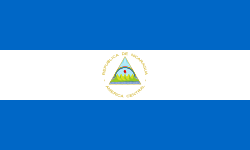| Nicaragua at the 1968 Summer Olympics | |
|---|---|
 | |
| IOC code | NCA (NIC used at these Games) |
| NOC | Comité Olímpico Nicaragüense |
| in Mexico City | |
| Competitors | 11 in 3 sports |
| Flag bearer | Donald Vélez |
| Medals |
|
| Summer Olympics appearances (overview) | |
Nicaragua competed in the Olympic Games for the first time at the 1968 Summer Olympics in Mexico City, Mexico. [1]
